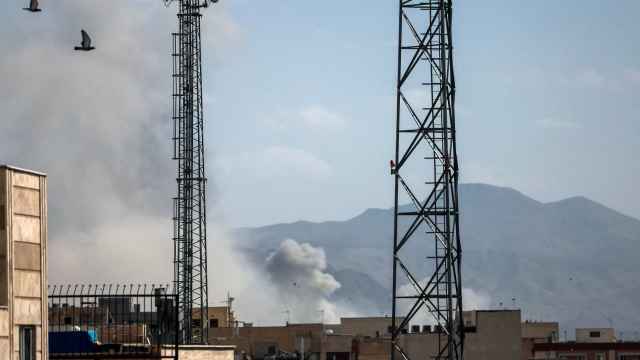The MT Conferences section did not involve the reporting or the editorial staff of The Moscow Times.

Peter Brophy
English Solicitor
Pepeliaev Group
Champions League soccer should return to Moscow later this month — or at least to Khimki, just outside the city boundary. Thanks to freakish weather and the current renovations to various venues in the capital, the reigning Russian champions CSKA Moscow were forced to switch their first game of the current European campaign to St. Petersburg, but they hope to play in familiar surroundings when the English team Manchester City visits on Oct. 23.
This game and CSKA's visit to Manchester two weeks later look decisive in terms of who qualifies from Group D for the knock-out stage in the new year. Both CSKA and City have beaten Czech outfit Plzen and lost comprehensively to the section's outstanding team Bayern Munich, so the team that comes out on top in the forthcoming head-to-head encounters should accompany the formidable Germans into the next phase.
Whichever of the two rivals comes out on top this time round, both are seeking to cement a position as mainstays in the tournament. Historically, neither of them was a regular participant in European soccer's flagship competition or its predecessor, the European Cup, until recently: CSKA had taken part only three times before 2003 and City just once before 2011.
As yet, though each has won a less prestigious European trophy in the past (City bagged the now-defunct European Cup Winners Cup in 1970 while CSKA won the UEFA Cup, as the Europa League was still then called, in 2005), neither has ever come close to winning the elite competition. City have yet to progress beyond the group phase in either of the last two seasons, but CSKA fared better the last two times they took part, their best effort coming in 2010 when they reached the quarter-finals.One of them will miss out on the knock-out rounds again, with Bayern already looking impregnable, but both will also have an eye on the longer term, hoping to make progress beyond the rung on the ladder they currently occupy. The complicating factor here is the new regulation introduced by UEFA, the governing body of European soccer. The so-called "Financial Fair Play Regulations" (FFP) aim to encourage clubs to live within their means if they want to be involved in UEFA competitions. The regulations are being phased in gradually, restrictions applying from the 2011/12 season onwards, and wealthy owners will be able to cover their clubs' losses only to a limited degree. For differing reasons, the post-FFPR climate represents a challenge for both City and CSKA.
Russian clubs earn between $3.9 and $6.5 million per season, while City picked up more than $92 million in 2013, news reports said.
It is an issue for City because the club has risen to prominence on the back of lavish investment by Abu Dhabi royal Sheikh Mansour bin Zayed Al Nahyan, who became owner in 2008. His largesse paid dividends in the form of the main domestic English cup in 2011 and an English Premier League title won in the most dramatic circumstances a year later. Before then, City had won no silverware of any description since the mid-1970s and had not been English champions since 1968. But the international stars who featured in these triumphs, like Sergio Aguero and Yaya Toure, have hardly come cheap, so many commentators have forecast that City will fall foul of the new rules.
At least City have the benefit of the eye-watering domestic and international broadcasting rights deals negotiated by the English Premier League, coupled with the attendant global commercial opportunities. CSKA's difficulty, in common with their rivals in the Russian game, is that their overall income levels are much lower. According to a recent article posted on the Russia Beyond the Headlines website, Russian clubs earn between $3.9 million and $6.5 million per season from TV. In contrast, City picked up more than $92 million in 2013 when finishing second in their domestic league.
City have run up costs to match in their attempt to rival the leading teams in Europe, but executives at the club insist that they do not fear the new regulations. Sponsors worldwide have been signed up to increase income in the manner typified by cross-town rivals Manchester United, and CEO Ferran Soriano, an executive who helped to maximise Barcelona's commercial potential in the last decade, says: "Our revenues will increase and we are not worried about FFP at all."
On the face of it, CSKA will find it much tougher to generate the revenues they need to pay for a team capable of challenging the biggest names in European soccer. Nonetheless, this is the Russian club that currently seems best placed to meet FFP. Whereas Zenit, the other Russian side currently in the Champions League, last year splashed vast amounts on foreign stars Hulk and Witsel, CSKA has traded cleverly over an extended period, offsetting money spent on new arrivals by allowing other players to leave for big fees.
The match on Oct. 23 is intriguingly poised, and while City will generally field players with bigger reputations, the track records of both clubs in this tournament suggest that the Mancunians would be unwise to take too much for granted. But whatever happens on the night, it will be equally fascinating to observe the fates of these two clubs in the coming years as they attempt in contrasting ways to negotiate the challenges of the European game at the highest level.
The MT Conferences section did not involve the reporting or the editorial staff of The Moscow Times.
A Message from The Moscow Times:
Dear readers,
We are facing unprecedented challenges. Russia's Prosecutor General's Office has designated The Moscow Times as an "undesirable" organization, criminalizing our work and putting our staff at risk of prosecution. This follows our earlier unjust labeling as a "foreign agent."
These actions are direct attempts to silence independent journalism in Russia. The authorities claim our work "discredits the decisions of the Russian leadership." We see things differently: we strive to provide accurate, unbiased reporting on Russia.
We, the journalists of The Moscow Times, refuse to be silenced. But to continue our work, we need your help.
Your support, no matter how small, makes a world of difference. If you can, please support us monthly starting from just $2. It's quick to set up, and every contribution makes a significant impact.
By supporting The Moscow Times, you're defending open, independent journalism in the face of repression. Thank you for standing with us.
Remind me later.





